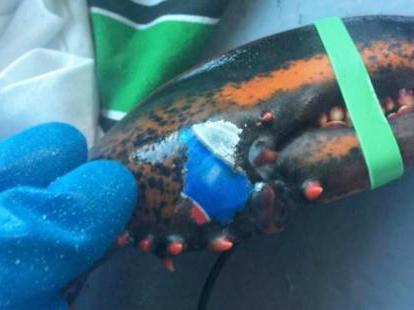The success of Blue Planet hopefully means there won’t be anymore ‘tattooed’ lobsters
Over half the planet depends on the ocean for food and all of us no matter where we live need a healthy ocean for the air we breathe. Knowing how high the stakes are means the declining state of the oceans is quite scary

Your support helps us to tell the story
From reproductive rights to climate change to Big Tech, The Independent is on the ground when the story is developing. Whether it's investigating the financials of Elon Musk's pro-Trump PAC or producing our latest documentary, 'The A Word', which shines a light on the American women fighting for reproductive rights, we know how important it is to parse out the facts from the messaging.
At such a critical moment in US history, we need reporters on the ground. Your donation allows us to keep sending journalists to speak to both sides of the story.
The Independent is trusted by Americans across the entire political spectrum. And unlike many other quality news outlets, we choose not to lock Americans out of our reporting and analysis with paywalls. We believe quality journalism should be available to everyone, paid for by those who can afford it.
Your support makes all the difference.It is a sign of the times: a lobster caught in New Brunswick, Canada, last week was found to have the Pepsi logo “tattooed” on its claw. We don’t know exactly how it happened, but it marks the latest in a seemingly unending list of bad news stories about the ocean. From whales with plastic bags in their stomachs to oysters with microplastics in their flesh, our impact on the ocean is starker than ever before – we are literally branding the creatures that live there.
Plastic pollution in the ocean is increasing at the rate of about a rubbish truck a minute and fragments of bottles, wrappers, fishing gear and more are being found everywhere from the Arctic ice to the deepest ocean canyons. Add into the mix climate change and overfishing and it can really make you want to slither down the bobbit hole.
Faced with the onslaught of stats and facts it isn’t hard to feel depressed about the state of the oceans. This is why I’m so grateful to the filmmakers and scientists behind Blue Planet. I’m grateful to the camera crew who spent months of their lives trying to work out the best way to capture the split second when an ugly goliath from the deep leaps out of the water to munch on a fledgling bird. I’m so grateful to the photographers and film-makers I am lucky enough to work with at Greenpeace. One of them, on our recent expedition to document the impact of plastic pollution on Scotland’s marine wildlife, camped for three days alone on a remote island to photograph nesting puffin colonies.
I’m grateful because what they produce is so brilliant that it forces us all to sit back and be amazed; to take the time to observe and learn about the millions and billions of creatures we share our blue planet with – each leading their own complex life in the most bizarre and incredible circumstances. Seeing this shared wonder in friends and family, who have always thought my job as a Greenpeace oceans campaigner a little odd, gives me some hope.
In the UK, the Environment Secretary Michael Gove said he feels haunted by plastic pollution and our Chancellor on Budget Day spoke about the need to tackle litter in our oceans. Major companies like Iceland and the Co-operative have announced their support for schemes to try and capture more of the 16 million plastic bottles a day that currently don’t get recycled. From beach cleans to repair workshops, community groups everywhere are doing their bit to reduce the amount of plastic going into the ocean.
And it doesn’t stop there. Last week the Mexican Government created a huge ocean sanctuary, a safe haven for the mind-blowing wildlife of the Revillagigedos islands, like manta rays and turtles. Next year the Antarctic Ocean Commission will be deciding whether to protect the largest area on earth in the Weddell Sea, putting it off limits to fishing and helping it to be more resilient in the face of our actions. The UK Government’s commitment to a Blue Belt of marine protection around our overseas territories gives us hope that there will be many more reasons to celebrate in the years to come.
The fact is we need actions like these. Over half the planet depends on the ocean for food and all of us no matter where we live need a healthy ocean for the air we breathe. Knowing how high the stakes are means the declining state of the oceans is quite scary. But the magnificent wildlife that lives there and the efforts of scientists and film-makers to educate us about it mean that the movement of people standing up to protect the oceans is getting stronger by the day.
Will McCallum is Head of Oceans for Greenpeace
Join our commenting forum
Join thought-provoking conversations, follow other Independent readers and see their replies
Comments